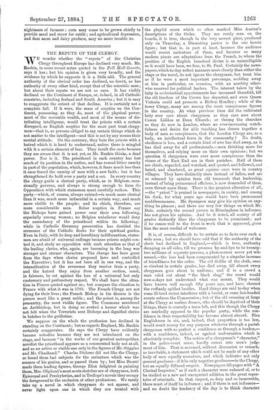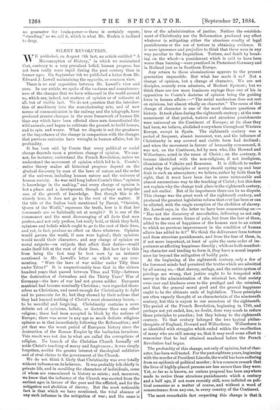THE REPUTE OF THE CLERGY.
WE wonder whether the " repute " of the Christian Clergy throughout Europe has declined very much. Mr. Ruskin, in some recent notes quoted. in the Pall Mall Gazette, says it has ; but his opinion is given very broadly, and the evidence by which he supports it is a little odd. The general authority of the clerical order has declined, no doubt, as has authority of every other kind, except that of the scientific men ; but about their repute we are not so sure. It has visibly declined on the Continent of Europe, or, indeed, in all Catholic countries, including Ireland and South America ; but it is easy to exaggerate the extent of that decline. It is certainly not a complete fall. If it were, the mass of sceptics on the Con- fluent, possessing, as they do, most of the physical power, most of the moveable wealth, and most of the means of dis- tributing intelligence, would treat the priests with a certain disregard, as English sceptics for the most part treat clergy- men—that is, as persons obliged to say certain things which do not matter to the intelligent—and this is not by any means their mental attitude. On the contrary, they hate the priests with a hatred which it is hard to understand, unless there is mingled with it a certain element of fear. They insult the caste because they are aware that it is not yet, as Mr. Ruskin thinks, a dead power. Nor is it. The priesthood in each country has lost much of its position in the nation, and has roused bitter enmity in part of the population, which, however, it fears much less than it once feared the enmity of men with a new faith ; but it has strengthened its hold over a party and a sex. In every country the clergy guide a clerical party, which, as in Belgium, occa- sionally governs, and always is strong enough to form the Opposition with which statesmen must carefully reckon. This party—which, of course, always existed—is much more clerical than it was, much more influential in a certain way, and much more visible to the people; and its chiefs, therefore, are
more considerable men. Sober sceptics in France say the Bishops have gained power over their own following, especially among women; no Belgian unbeliever would deny the ascendancy of the priesthood within its following; while in Catholic Germany persecution has doubled the reverence of the Catholic flocks for their spiritual guides. Even in Italy, with its deep and hereditary indifferentism, states- men are afraid of universal suffrage because priests might con- trol it, and study no opposition with such attention as that of the leading clerics, who, again, are becoming in the long war stronger and sterner characters. The change has been great from the days when clerics proposed laws and controlled the Executive ; but it has not been all in one way, and the intensification of the reverence they receive from a party, and the hatred they enjoy from another section, must, in fairness, be set against the loss of a universal but only customary and perfunctory respect. We shall have the situa- tion in France quoted against us ; but compare the situation in France with what it was in 1793. The French Clergy are not flying for their lives ; the French Bishop in his diocese is the person most like a great noble ; and the priest is, among the peasantry, the most visible figure. The Commune murdered an Archbishop, but in doing so evoked a horror which was not felt when the Terrorists sent Bishops and dignified clerics in batches to the guillotine.
We suppose on the whole the profession has declined in standing on the Continent; but as regards England, Mr. Ruskin certainly exaggerates. He says the Clergy have evidently become nobodies because they are not introduced on the stage, and because "in the works of our greatest metropolitan novelist the priesthood appears as a consecrated body not at all, and as an active or visible one only in the figures of Mr. Stiggins and Mr. Chadband." Charles Dickens did not like the Clergy, or found them bad subjects for the caricature which was the essence of his genius, and so passed them by ; but Miss Brontë made them leading figures, George Eliot delighted in painting them, Mrs. Oliphant's most acute sketches are of clergymen, both Episcopal and Presbyterian, and in Trollope's novels they occupy the foreground to the exclusion of other professions. We rarely take up a novel in which clergymen do not appear, and never light upon one in which they are treated with the playful scorn which so often marked Miss Austen's descriptions of the Order. They are rarely seen on the boards, it is true, though in the very newest piece, produced only on Thursday, a Dissenting pastor is the one heroic figure ; but that is, in part at least, because the audience would resent caricature of them, and because so many modern pieces are adaptations from the French, to whom the position of the English beneficed divine is as unintelligible as it would have been, we fear, to St. Paul. Certainly the news- papers,which to-day reflect manners more closely than either the stage or the novel, do not ignore the clergyman, but treat him as if he were a most important personage, scolding away at him in particular, on occasion, with an acerbity other- wise reserved for political leaders. The interest taken by the laity in ecclesiastical appointments has increased threefold, till the old freedom of the Crown has departed, and even Queen Victoria could not promote a Bishop Hoadley ; while of the lower Clergy, many are among the most conspicuous figures in the country. At what previous time did the cultivated laity ever care about clergymen as they care now about Canon Liddon or Dean Church; or throng the churches as they do now in London, where an ever-increasing watch- fulness and desire for able teaching has drawn together a body of men so conspicuous, that the London Clergy are, as a body, an intellectual force in the community ? No doubt, obedience is less, and a certain kind of awe has died away, as it has died away for all professionals,—men thinking more for themselves, and relying more on their own opinions ; but we question if clergymen were ever more conspicuous than the vicars of the East End are in their parishes. Half of them are chiefs, regarded, and watched, and qnoted, and followed, and hated, and slandered, as great squires once were in country villages. They have distinctly risen instead of fallen, and are so released by opinion from old trammels that leadership, instead of being pronounced officious, is now demanded of them, even thrust upon them. There is the greatest alteration of all, —the " priest " is praised in newspapers, in society, and among his flock, for what years ago would have been pronounced meddlesomeness. Mr. Spurgeon may give his opinion on any- thing he pleases ; and there are very few things on which Mr. Dale, certainly the second person in Birmingham in influence, has not given his opinion. And be it noted, all society of all grades distinctly likes the clergyman to be prominent ; and if he comes well to the front in work that is approved, gives him the most cordial of welcomes.
It is, of course, difficult to be certain as to facts over such a wide area ; but we should have said that if the authority of the cleric had declined in England,— which is true, authority decaying on all sides, till we promise by-and-bye to be twenty- two millions of separate persons, a phenomenon never yet wit- nessed,—the loss had been compensated by a singular increase of friendliness for the order. The old dislike of the cloth, once so virulent in certain grades, has died away, till almost every clergyman goes about in uniform; and if in a crowd a man cried out about "the black slug," the crowd would now-a-days not understand what was meant. They would have known well enough fifty years ago, and have cheered the ruffianly epithet besides. Hard things are said to-day when some ill-bred rector interferes with a burial, or some hot-headed curate refuses the Communion; but of the old swearing at large at the Clergy as useless drones, who should be deprived of their liiings, there is scarcely a trace left, and this though the Clergy are markedly opposed to the popular party, while the con- fidence in their respectability has become almost absurd. Five Englishmen in six, and, indeed, that proportion is too low, would remit money for any purpose whatever through a parish clergyman with as perfect a confidence as through a banker,— with a confidence, indeed, as against malversation which is absolutely complete. The notion of a clergyman's "character," in the police-court sense, hardly enters into men's judg- ment of him. That is assumed, without discussion or remark, as inevitable, a statement which could not be made of any other body of men equally numerous, and which indicates not only general goodness—if it be only negative goodness—in the Clergy, but an equally diffused respect. Newspapers fill pages with "A Clerical Impostor," as if such a character were unheard of, or to be studied as a new and unexpected addition to the great reper- toire of criminals. In that respect, so deep and so immovable, there must of itself be influence ; and if there is not influence— and no doubt the tendency of the day is to think character
no guarantee for brain-power — there is certainly repute, "standing," as we call it, which is what Mr. Ruskin is inclined to deny.

































 Previous page
Previous page